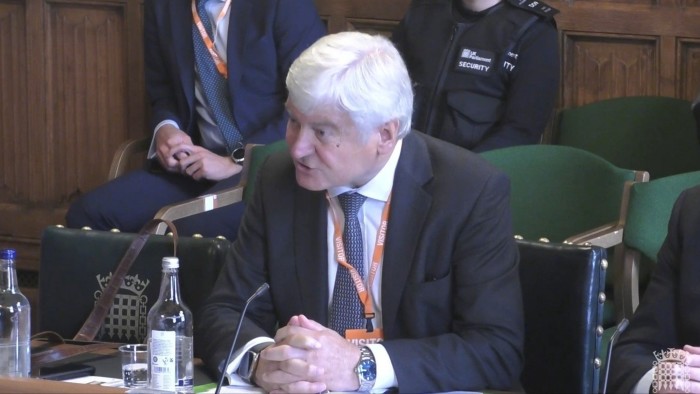Unlock the Editor’s Digest for free
Roula Khalaf, Editor of the FT, selects her favourite stories in this weekly newsletter.
Thames Water’s senior executives will receive lavish “retention incentives” as part of a £3bn emergency loan agreed by the utility that is seeking to stave off renationalisation.
Some executives are in line for “50 per cent of salary; very substantial bonuses” as part of the loan agreed with creditors including the US hedge funds Elliott Management and Silver Point Capital, Thames Water chair Sir Adrian Montague told parliamentarians on Tuesday.
Montague claimed that Thames Water had to keep paying bonuses to prevent rival companies from “picking off” its best employees.
“We have a bonus scheme to protect our most precious resource, which is the senior management team,” Montague told the cross-party environment select committee.
The bonuses will be paid in three tranches in addition to their annual salaries and bonus, the MPs were told.
Montague, a City of London veteran, admitted it was an unusual deal: “This is the first time I’ve encountered this, I’ve done a few restructurings in my time,” he said. “We need this team to stay.”
Chris Weston, a former British Gas executive, was appointed as chief executive of Thames Water in December 2023 and was criticised for taking a £195,000 bonus for his first three months in the job. He is on a total pay package of as much as £2.3mn a year.
The select committee hearing comes as Thames Water, the UK’s largest water utility, tries to fend off renationalisation under the government’s special administration scheme. The company, which serves about a quarter of the country’s population, is struggling under the weight of its £20bn debt mountain and is in exclusive discussions with the private equity firm KKR to take over the business.
The £3bn creditor loan — which was challenged in court by rival bondholders — comes with a 9.75 per cent interest rate, plus fees. But Montague argued that the company needed to agree to the deal because Thames Water’s “hair raising” financial crisis meant the UK’s largest water utility had just five weeks’ cash left at times in the past year.
“Thames in the last year has come very close to running out of money entirely. There were times in the past year when we had five weeks’ liquidity: running a £20bn corporation on five weeks’ liquidity — honestly it’s hair-rising,” he told MPs on Tuesday.
Montague defended the agreement to give KKR the exclusive right to a deal, even though Thames Water received five other bids. “The KKR bid was by far and away the best, technically, financially, in terms of the commitment to provide equity, they were ahead,” he said.
He added that he expected much of the board to step down if the £4bn KKR deal is confirmed: “When you have a change in control of a big company like this, you have to expect there will be huge changes in the board, it may be that the new equity owners will want some people to stay but the expectation is that the majority will step down.”




